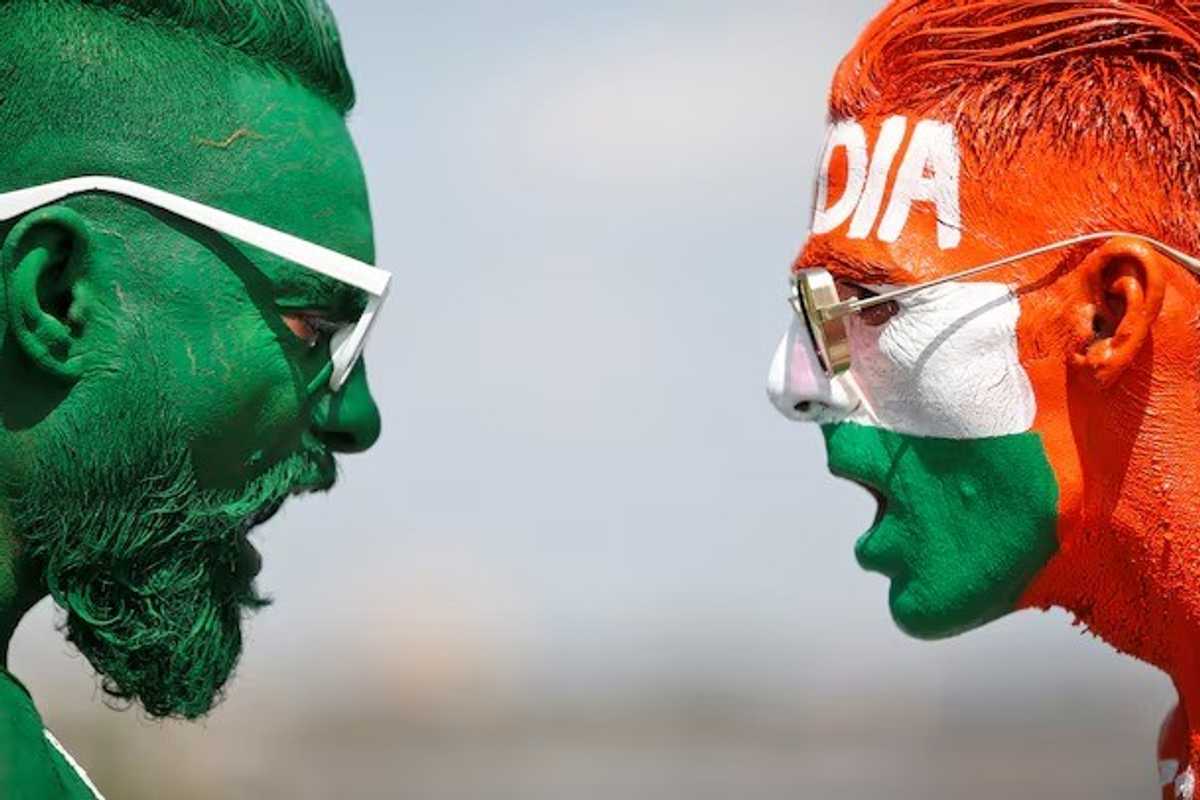By refusing to send its cricket team to Pakistan, India is hitting where it hurts
Pakistan is the first and biggest victim of India’s domination of world cricket. But in the long run it will be the sport itself that might get hurt.

Khalid Hussain
Editor Sports
Khalid is a battle-hardened sports journalist with a career spanning over 34 years. From a roving reporter, he switched to leadership roles in Pakistan and Saudi Arabia.

Pakistan and Indian cricket fans react before a match.
Reuters
Earlier this week, Greg Barclay ended his tenure as the International Cricket Council (ICC) chairman with a grim parting shot: “Cricket is sleepwalking towards a cliff edge”.
But the New Zealander, in what was a wide-ranging interview with The Telegraph, fell short of directly pointing a finger at the force that is currently leading the sport towards, what one fears, will be a great fall: the Indian cricket board (BCCI).
‘Yoke of India’
Barclay did talk about India’s power and hoped that cricket won’t live under the “yoke of India”.
The problem is that it already is and surely Barclay is aware of it.
After all, he did not seek another term as ICC chairman in order to make way for Jay Shah, the 36-year-old son of India’s Minister of Home Affairs, Amit Shah.
Jay Shah had been running the BCCI as its secretary since 2019. Then he decided it was time for him to run the ICC and soon Shah was elected as chairman of the world body. Barclay had no other option but pack his bags and allow Shah to become the youngest ever ICC chairman.
That’s the sort of power India, the game’s financial powerhouse, enjoys in international cricket.
And that’s the sort of power, if allowed to be exercised blatantly, could throw international cricket into disarray.
It’s already happening.
Political move
India’s refusal to visit Pakistan for next year’s ICC Champions Trophy and the resulting impasse highlights the fact that all is not well in world cricket.
It is an open secret that India’s decision to boycott matches in Pakistan is a political move, taken, not by the BCCI, but by the country’s nationalist BJP government.
India’s is using its cricket team to achieve larger geopolitical aims. The government sees it is an asset that can be used against Pakistan. Hence the refusal to send the Indian team to Pakistan.
In an ideal world, there should be no room for politics to mix with sports. But it’s not an ideal world. In fact, world cricket has, in recent years, been governed by the rule of the jungle where might is always right.
Too much power
India’s might doesn’t augur well for the sport. There’s just too much power placed in the lap of one single country.
The Champions Trophy stalemate has once again underlined the fact that India’s vast influence in international cricket needs to be curbed. But there is little hope that such a thing would happen.
Instead, India’s influence will continue to grow now that Jay Shah, the Indian cricket board (BCCI) kingpin, has taken over as ICC chairman.
On his first visit of the ICC headquarters in Dubai in his capacity as chairman earlier this week, Shah uttered all the right words. He stressed that the ICC was embarking on a new era and that his goal was to take the sport to "unprecedented heights" collectively with other member countries.
Well, he should know that other member countries also include Pakistan.
In his role as the BCCI secretary, Shah used all his powers to undermine Pakistan cricket.
Under his watch, the ban on Pakistani cricketers’ participation in the Indian Premier League (IPL) remained intact. No effort was made to normalize cricketing relations with Pakistan.
But that was hardly surprising considering that Shah represents the BJP (his father is the Minister of Home affairs and a close aide of Indian premier Narendra Modi).
One of the BJP’s biggest assets when it comes to elections is its anti-Muslim and anti-Pakistan rhetoric.
It’s been 16 years since the Mumbai attacks, for which India blames terrorists based in Pakistan, but the BJP is still using those tragic happenings to hurt its neighbor.
Just four years after the Mumbai attacks, Pakistan’s cricket team was welcomed in India for a full white-ball series. Following the 26/11, India has regularly played against Pakistan in international contests like the World Cups, Champions Trophy etc.
But it has frowned at the idea of bilateral matches. And it has completely ruled out the idea of playing on Pakistani soil.
Why this hypocrisy?
Why is India playing against Pakistan in ICC events? It should boycott those games as well.
But India does whatever suits its interests. A blanket boycott against Pakistan could mean conceded games in events like the World Cups and that would harm India.
The problem with India, more specifically BJP, is that it is using all tactics to undermine Pakistan.
It is trying to hit where it hurts and that’s where cricket comes in.
There is no doubt that India is the financial engine of world cricket, contributing around three-quarters of the revenues.
Paying the piper
It’s India who is paying the piper and calling the tune.
Lured by the billions of dollars coming from India, other cricket boards are at the beck and call of the BCCI. The ICC, which is supposed to be the governing body of the international game, has almost become a silent spectator.
Pakistan is the first and biggest victim of India’s domination of world cricket. But in the long run it will be the sport itself that would get hurt.
Barclay, in his parting shot, hoped that Shah’s entry as ICC chairman, will “help unite and grow the game”.
Going by his past track record, such an outcome under Shah’s watch, seems quite unlikely.
Khalid Hussain is Editor Sports of Nukta







Comments
See what people are discussing